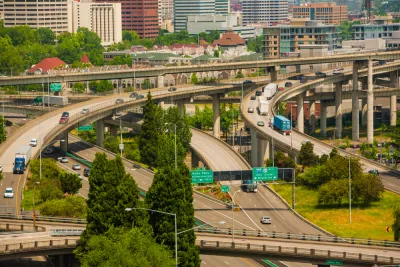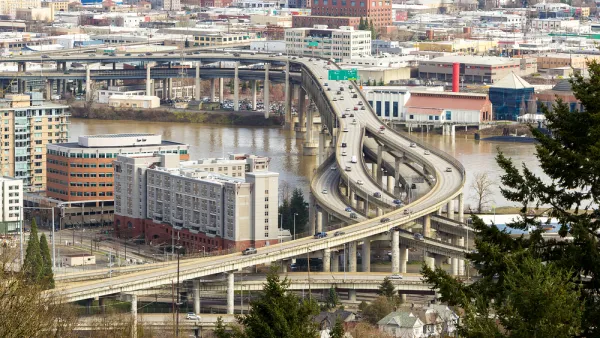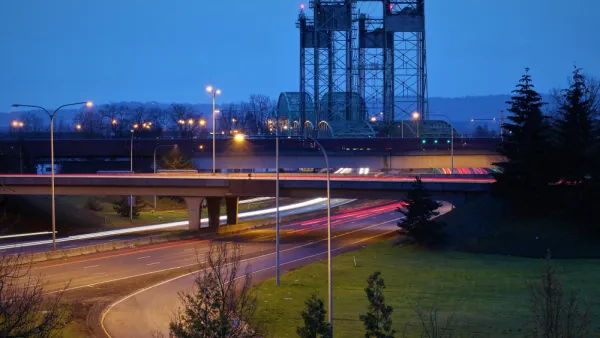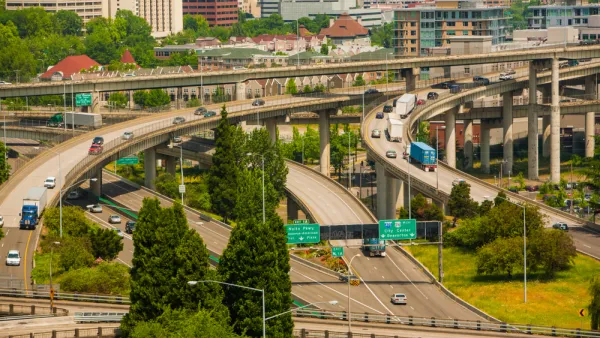The state that implemented the first gas tax and the first bike tax took a huge step on Thursday toward becoming the first, since 1956, to toll all lanes on an interstate highway by approving an application to the Federal Highway Administration.

"The Oregon Transportation Commission voted Thursday [Dec. 6] to approve the state’s application to the federal government to consider tolling on portions of Interstate 5 and Interstate 205 in Portland," reports Andy Matarrese for the Vancouver, Washington-based Columbian.
Federal law governs when tolling is allowed, especially for interstate highways. The law typically allows tolls on interstates for repairing or replacing bridges, tolling in a new lane, or turning a carpool lane into a toll lane, according to the Oregon Department of Transportation (ODOT).
Oregon is asking the Federal Highway Administration (FHWA) for authority to toll existing lanes under a federal pilot program for value pricing tolling.
The commission was enacting landmark transportation funding legislation, House Bill 2017 that hiked gas taxes by 10 cents per gallon, approved in July 2017. Thursday's vote was the culmination of the work by the Portland Metro Area Value Pricing Policy Advisory Committee which has received public input from the region on the congestion-reduction project since Nov. 20, 2017 [pdf]. The first recommendations were received last May.
The state’s application essentially asks the highway administration for its OK to proceed. The state wants to confirm whether the tolling plan would be eligible under federal tolling program rules, and is also asking for guidance on how it will have to proceed with environmental impact reviews.
"Congestion in this area is creating problems in our quality of life and damaging our economic advantage,” said Tammy Baney, the Commission chair in a press release on the historic 5–0 vote that identifies the general locations on the two roads for tolling, and how revenues may be used.
“This is why we’re looking at the possibility of tolling to manage congestion and generate additional revenue. We need options and tools and this is one.”
Tolling will not "flat" like the nation's newest toll road outside Charlotte, N.C. Instead, it will be "value-priced" to manage demand on the roadways.
Next steps
If the application is approved, the commission will commence work on the specifics of the project, which have yet to be worked out.
According to ODOT, the application asks the FHWA to "clarify and confirm three critical next steps in the process:"
- Which of the several federal tolling programs are appropriate for Oregon’s plans.
- The nature of the analysis and project development needed under the National Environmental Policy Act (NEPA), a necessary part of the process.
- An estimate of the timeline needed for NEPA review.
Roadblocks ahead
However, it is not just the federal government that will determine whether the two stretches of freeways become tollways, as political hurdles emerged during the outreach process:
- State voters may have the ultimate say in whether tolling is applied, or how it is applied, should Initiative Petition 10 qualify for the 2020 ballot.
- Interference could come from Gov. Jay Inslee (D-Wash.), a climate warrior who has become protectionist when it comes to subjecting Washington state residents, mostly those living in Vancouver and Clark County, to the new tolls.
Another challenge from the Evergreen State is posed by U.S. Rep. Jaime Herrera Beutler, R-Battle Ground, who views the value pricing proposal as a "cash grab" by Oregon, reports Matarrese.
“Oregon knows revenue can be collected at those spots without any political recourse from Southwest Washington residents who have no vote in the matter, which is why it continues to barrel ahead without presenting any kind of plan to improve the infrastructure that most Southwest Washingtonians actually use,” she said in a statement.
State and local leaders will need to consider the impacts on neighborhoods as well, particularly from "cut-through" traffic seeking to avoid the tolls depending upon their location, which may conflict with concerns of Washington state residents, reports Andrew Theen for The Oregonian.
Chris Trejbal from North Portland’s Overlook Neighborhood Association said he was concerned the state was bowing to political pressure from Washington politicians and commuters who balk at the toll being placed at the border between the two states.
A fourth 'first'?
Should the state surmount all the hurdles and, many years from now actually toll all the lanes on the two stretches of interstate highways, it will have achieved the fourth "first" in state transportation funding after enacting:
- The nation's first gas tax in 1919.
- The nation's first actual road usage charge, aka vehicle-miles traveled fee, program in July 2015, although ODOT is a limited, voluntary program. Pilot programs [pdf] were launched in 2007 and 2013.
- The nation's first bike tax this year.
- Advisory Committee Recommends Complete Tolling of Portland Interstates, July 9
- Priced Lane or Priced Roadway? May 17
-
Analysis Debunks Equity Criticism of Congestion Pricing, Oct. 24, 2017: Oregon's recently approved gas tax legislation that calls for tolling of I-205 and I-5 has raised equity concerns.
FULL STORY: Oregon transportation board submits I-5, I-205 tolling plan application to feds

Analysis: Cybertruck Fatality Rate Far Exceeds That of Ford Pinto
The Tesla Cybertruck was recalled seven times last year.

National Parks Layoffs Will Cause Communities to Lose Billions
Thousands of essential park workers were laid off this week, just before the busy spring break season.

Retro-silient?: America’s First “Eco-burb,” The Woodlands Turns 50
A master-planned community north of Houston offers lessons on green infrastructure and resilient design, but falls short of its founder’s lofty affordability and walkability goals.

Test News Post 1
This is a summary

Analysis: Cybertruck Fatality Rate Far Exceeds That of Ford Pinto
The Tesla Cybertruck was recalled seven times last year.

Test News Headline 46
Test for the image on the front page.
Urban Design for Planners 1: Software Tools
This six-course series explores essential urban design concepts using open source software and equips planners with the tools they need to participate fully in the urban design process.
Planning for Universal Design
Learn the tools for implementing Universal Design in planning regulations.
EMC Planning Group, Inc.
Planetizen
Planetizen
Mpact (formerly Rail~Volution)
Great Falls Development Authority, Inc.
HUDs Office of Policy Development and Research
NYU Wagner Graduate School of Public Service




























